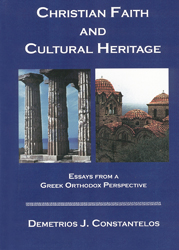 D. Constantelos
D. Constantelos
Christian Faith and Cultural Heritage
by George Papademetriou Prof. of Patristics
Christian Faith and Cultural Heritage, a new book by the Rev. Professor Demetrios Constantelos, is a welcome addition to the list of books that explore the relationships between religion and culture, faith and reason, the interrelationship between Hellenism, Judaism and Christianity. It should be of interest to theologians, historians and persons of other fields interested in an interdisciplinary approach to knowledge. It is of special significance to people of the Orthodox Christian faith, and others of Greek ancestry.
In three major parts, sixteen chapters and 352 pages, the author examines several aspects of the encounter between Hellenism and Christianity. This topic is of particular interest to Orthodox Christians who live in the United States, Canada, Australia and other English speaking countries. While many Greek Orthodox of the diaspora insist on preserving their long standing cultural heritage, including their ancestral language with its unique and unbroken oral and written tradition, others claim that only religion counts.
The first part of the book, in five chapters, includes a lengthy chapter on the interrelationship of Hellenism with Christianity, including the influence of Hellenism on Judaism and in return of Judaism on Hellenism during late antiquity. The Centrality of Christ and Religion Pluralism and the Attitude of Orthodox Christians toward the other—both are of ecumenical interest.
The second and larger part of the book examines the Greek background of several aspects of Christian beliefs, ethical principles and educational ideals. The background of Christian philanthropia, monastic philanthropy, the influence of Byzantine philanthropy in the Western Middle ages, Greek and Christian Orthodox mysticism, and Liturgy and liturgical life are some of the themes explored and expertly discussed.
The third part of the book is addressed primarily to people outside of Greece. An Old Heritage is a New World addresses topics of extreme interest to Greek Americans, Greek Australians, Greek-Canadians who are concerned with how to maintain and grow spiritually and at the same time preserve a Greek cultural identity. Faith, culture and family values, ethnic particularities and the universality of their Orthodox Christian faith, the relationship between religious faith, and ethnic holidays are topics that have preoccupied theologians, sociologists, historians, and business leaders in several parts of the world.
The interdisciplinary work of Professor Constantelos highlights what was observed long ago by other scholars. Werner Jaeger, the author of the monumental study on Greek Paideia and the theology of Greek philosopher, writes that “without the large post classical evolution of Greek culture the rise of a Christian world-religion would have been impossible.” On the other hand, the Christian theologian-philosopher Paul Tillich in his penetrating and original studies on theology, philosophy-sociology-history adds that the evolution of the Christian faith around the world has been conditioned by the country’s cultural heritage. He writes that “culture is the form of religion and religion is the heart of culture, that is, the two are inseparable.”
Dr. Constantelos has demonstrated in his book Christian Faith and Cultural Heritage that Christian Hellenism, whether of the Byzantine centuries or the modern era, is a brilliant illustration of the observation made by the two scholars cited above. His present book stimulates the mind and enriches our knowledge on a theme of perpetual interest.
|
|
|











